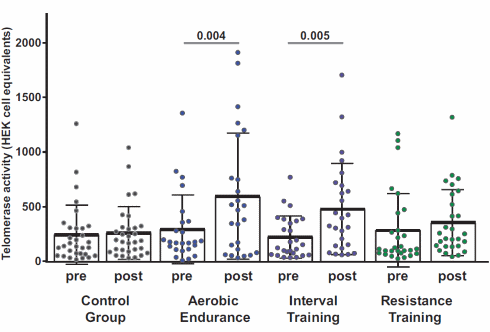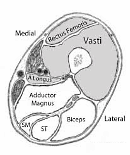|
Definition: "An ergogenic aid is any substance or phenomenon that enhances performance "
|
|
||||||||
04.12.2018 |
|
|
Endurance training, interval training makes biological clock tick slower
If you want to live longer, then exercise. Go running or cycling, and make sure your fitness improves - read: that your body's ability to absorb oxygen increases. Endurance training makes the biological clock tick slower, German cardiologists write in the European Heart Journal. They did the largest randomised long duration study comparing different training modalities with a control group until now.
Longevity & endurance training
You can read more about telomeres here.
The longer your telomeres are, the younger you are at a molecular level. But how do you interpret those findings? Does training slow down the biological clock in your genes? Or do people with a slow ticking biological clock participate more often in endurance sports?
In order to find an answer to that question, the researchers decided to carry out a trial. A large trial.
Study
The researchers divided the men into 4 groups. A first group did not participate in any physical activities during the experiment. This was the control group. The remaining 3 other groups trained 3 times a week. Each session lasted about 45 minutes.
The first execise group did traditional endurance training. The men went jogging at 60 percent of their maximum heart rate.
The second exercise group did interval training. After a warming-up the men ran for 4 minutes with an intensity of 89-90 percent of their maximum heart rate, after which they ran for 3 minutes with an intensity of 60-70 percent of their maximum heart rate. They repeated this cycle 3 times. The men finished their workout with a cool-down.
Before and after half a year, the researchers took cells from the subjects' blood and determined the length of the telomeres in the DNA of those cells. The quicker you age, the faster the telomeres in your DNA become shorter. Healthy lifestyle, on the other hand, can activate the telomerase enzyme, which makes the telomeres in cells longer.
Results
Classical endurance training and interval training increased the manufacture of NO in the bloodstream, and increased the maximal oxygen uptake [VO2max]. The latter parameter correlated with the increase of the telomere length: the greater the increase of the VO2max, the greater the increase of the telomere length.
Conclusion
"Interestingly, resistance training did not exert these effects."
"The study identifies a mechanism by which endurance training, but not resistance training, improves healthy aging. It may help to design future studies on this important topic by using telomere length as indicator of 'biological age' in future intervention studies."
"The study has several implications", says first author Christian Werner. "Our data support the European Society of Cardiology's current guideline recommendations that resistance exercise should be complementary to endurance training rather than a substitute."
"From an evolutionary perspective, endurance and high intensity training may mimic the advantageous travelling and fight or flight behaviour of our ancestors better than strength training."
Source: More: Archives:
|
|
|||||||||||||||||








